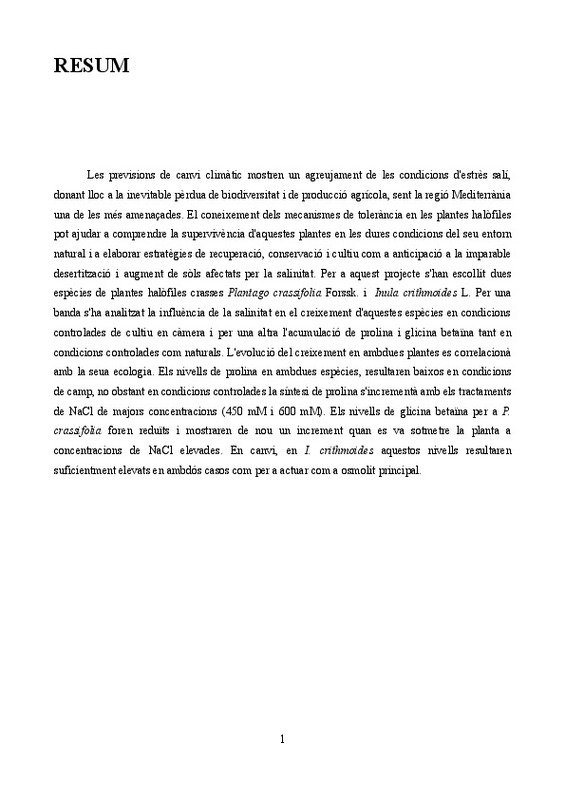|
Resumen:
|
[CA] Les previsions de canvi climàtic mostren un agreujament de les condicions d'estrès
salí, donant lloc a la inevitable pèrdua de biodiversitat i de producció agrícola, sent la
regió Mediterrània una de les més amenaçades. ...[+]
[CA] Les previsions de canvi climàtic mostren un agreujament de les condicions d'estrès
salí, donant lloc a la inevitable pèrdua de biodiversitat i de producció agrícola, sent la
regió Mediterrània una de les més amenaçades. El coneixement dels mecanismes de
tolerància en les plantes halòfiles pot ajudar a comprendre la supervivència
d'aquestes plantes en les dures condicions del seu entorn natural i a elaborar
estratègies de recuperació, conservació i cultiu com a anticipació a la imparable
desertització i augment de sòls afectats per la salinitat. Per a aquest projecte s'han
escollit dues espècies de plantes halòfiles crasses Plantago crassifolia Forssk. i Inula
crithmoides L. Per una banda s'ha analitzat la influència de la salinitat en el
creixement d'aquestes espècies en condicions controlades de cultiu en càmera i per
una altra l'acumulació de prolina i glicina betaïna tant en condicions controlades com
naturals. L'evolució del creixement en ambdues plantes es correlacionà amb la seua
ecologia. Els nivells de prolina en ambdues espècies, resultaren baixos en condicions
de camp, no obstant en condicions controlades la síntesi de prolina s'incrementà amb
els tractaments de NaCl de majors concentracions (450 mM i 600 mM). Els nivells
de glicina betaïna per a P. crassifolia foren reduïts i mostraren de nou un increment
quan es va sotmetre la planta a concentracions de NaCl elevades. En canvi, en I.
crithmoides aquestos nivells resultaren suficientment elevats en ambdós casos com
per a actuar com a osmolit principal.
ABSTRACT
[-]
[EN] Predictions of climate change are worsening the conditions of salt stress, resulting in
an inevitable loss of biodiversity and agricultural production, being the
Mediterranean one of the most threatened regions of ...[+]
[EN] Predictions of climate change are worsening the conditions of salt stress, resulting in
an inevitable loss of biodiversity and agricultural production, being the
Mediterranean one of the most threatened regions of world. Knowing the
mechanisms of tolerance in halophytic plants may help to understand the survival of
these plants in the harsh conditions of their natural environment and to propose
strategies for recovery, conservation and cultivation as an anticipation of the
unstoppable desertification and the increase of soils affected by salinity. Two
halophytic succulent plant species, Plantago crassifolia Forssk. and Inula
crithmoidesL. were chosen for this project. The influence of salinity on the growth of
these species under controlled cultivation chamber was analyzed. Moreover, the
accumulation of proline and glycine betaine were analyzed in both controlled and
natural conditions. The evolution of growth in both plants was correlated with their
ecology. Proline levels in both species were low in field conditions, but under
controlled conditions the synthesis of proline increased with higher concentrations of
NaCl (450 mM and 600 mM). The levels of glycine betaine for P. crassifolia were
low and showed an increase only when plants were subjected to higher NaCl
concentrations. In contrast, levels of glycine betaine in I. crithmoides were
sufficiently high in both cases to act as principal osmolyte
[-]
|








